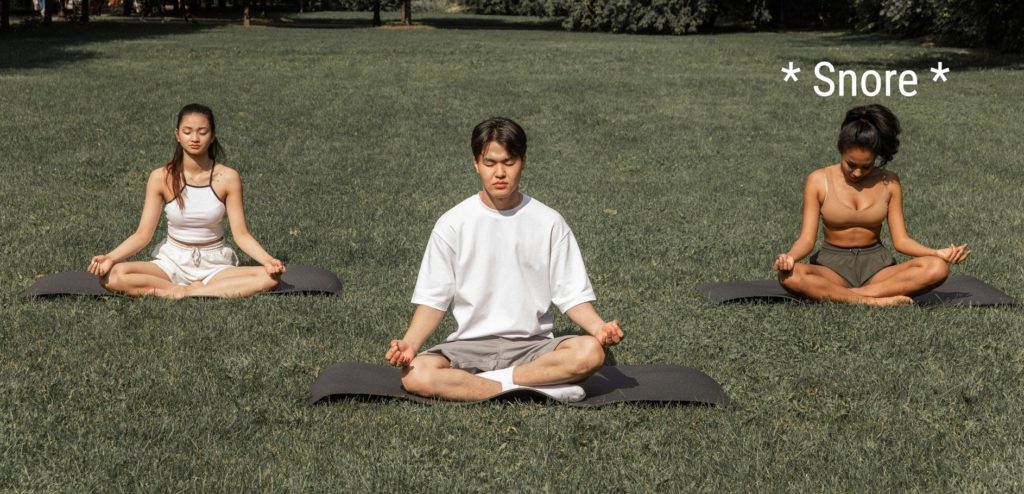I wouldn’t say that compassion and empathy come naturally to me. I wish it did, at least up to a point, but it’s just not the direction my mind would go if I didn’t herd it in that direction.
This is a problem when it comes to doing good work. I mean, you just tend to push harder when you’re more aware of people who may benefit from your efforts.
There’s lots of other benefits too (read on for more).
There’s good news though: The latest research suggests that meditation can be effective at rewiring our brain to consider others more. Specifically through a special format known as lovingkindness.

Paving Over Old Patterns
Lemmie catch you up on some basic psychology:
It’s fairly common knowledge that many/most of our thought patterns were ‘taught’ to us through childhood experiences.
These include how safe the world is, how trustworthy people are, and whether the Flying Spaghetti Monster is indeed a thing.
Before the 1990s, there was little evidence to suggest that this circuitry could be altered in adulthood.
This changed abruptly with the concept of neuroplasticity, which is a fancy way of saying our brains can indeed change in many ways, including how we view our fellow person.

So How Does Lovingkindness Meditation Work?
First thing we need to establish here is that there are many kinds of meditation, and they train your brain in different ways.
Lovingkindness meditation follows the following format (or similar variation):
- Repeating a mantra like ‘may I be safe’, ‘may I find peace’, or even just the word ‘joy’.
- Expanding that positive feeling outwards to include people you feel close to, like family members.
- Continuing to expand to include more neutral people, then people you don’t get along with as well, and even people you’ve never met.
Whether or not said people deserve your well-wishes is a moot point – what matters is you’re practicing thinking of others with compassion, instead of judgement.

If you’re a busy composer or producer, sitting still for any amount of time might sound like the LAST thing you need – but seriously, you don’t need long.
Even seven minutes of lovingkindness meditation has been shown to increase participant’s sense of well-being and connection to others (Cendri A. Hutcherson et al., 2008).
And more permanent shifts have been recognized in individuals who make this a regular practice.
Okay, But Is It Really Worth It?
Well, lets ‘count’ the ways, shall we?

1.
Lovingkindness begins with promoting compassion for yourself first. That means more constructive criticism, and less beating yourself up.
2.
Self-focused thinking tends to create a lot of anxiety (yup) – Focusing on helping others can be a much-needed break from the chattering ‘monkey mind’.
3.
As Steve from The Tao of Steve once said: ‘Women can smell an agenda like sh*t on a sandal.’ In other words, people can tell when you’re faking.
Practicing lovingkindness meditation can bring a new authenticity to your interactions with clients, technicians, and other musicians.
4.
On a related note, the more people like you, guess what? The more they want to buy your music!

5.
Finally, (and again, this is science people), when we increase our capacity for empathy and compassion, our overall level of happiness increases as well. (Tania Singer and Olga Klimecki, 2014).
Let me wrap up with a personal note on how building one’s empathy can benefit our lives:
A few years ago, if my wife and I had a conversation about a controversial or triggering subject, I would often fail to listen. I would get angry, and fail to stop the signs of anger. I would put my own agenda first.
Over time however, I’ve grown better at listening, and spotting signs I’m about to sabotage myself, and the conversation. I’ve learned to consider her, and others, more than I used to.
We’re happier for it. And I know we can be happier still. You can too.
Credits:
Cendri A. Hutcherson et al., “Loving-Kindness Meditation Increases Social Connectedness,” Emotion 8:5 (2008): 720-24.
‘Closeup Photo of Gray Cat’ by Skitterphoto from Pexels
‘Hands Holding a 10 Dollar Bill’ by Karolina Grabowska from Pexels
‘Multiethnic group of friends practicing yoga in park’ by Monstera from Pexels
Tania Singer and Olga Klimecki, “Empathy and Compassion,” Current Biology 24:15 (2014): R875-R878

